Turn a corner on Moscow’s wide avenues and the city reveals its many faces. The colorful domes of the St. Basil’s Cathedral tower over Red Square, while modern skyscrapers rise in the distance, reminders of a city always in motion.
In the grand halls of the Moscow Metro, marble and mosaics turn each station into an underground gallery. The city’s vast parks offer unexpected breathing spaces, like Kolomenskoye, where history and greenery meet. Moscow is read through contrasts — imperial splendor set against the rhythm of daily life.
But Moscow is more than its famous monuments. Markets buzz with voices and scents, cafés fill with late-night conversations. It’s a capital that feels raw yet magnetic, an atmosphere you carry with you long after the journey ends.
Top 5 Guided Tours
Places to Visit
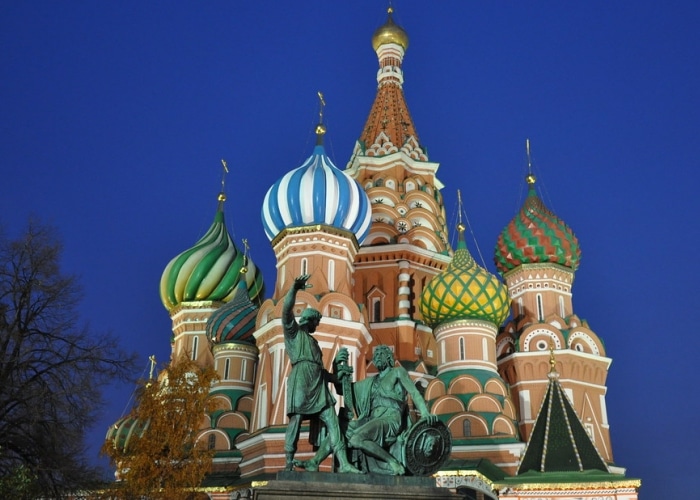
On Red Square, St. Basil’s Cathedral rises with its multicolored domes that look as if they’ve stepped out of a fairy tale. The exterior immediately catches the eye, but it’s once you step inside that you discover a maze of chapels and narrow passageways.
Each room has its own decoration — geometric frescoes, painted vaults, icons hanging in the dim light. The atmosphere shifts from space to space, moving between quiet reverence and awe at the richness of detail.
All around, Red Square stretches wide, framed by the walls of the Kremlin and the pale façades of the GUM department store. Together they form a monumental setting, steeped in history, making the visit even more unforgettable.
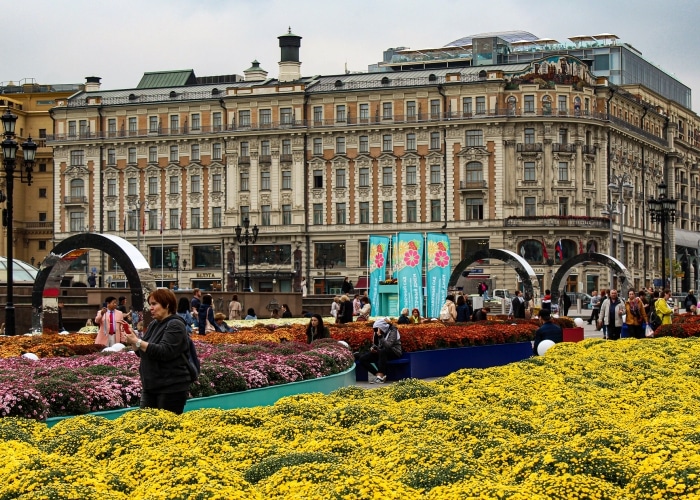
Once surrounded by walls, Kitai-Gorod sits right in the city center, just steps from Red Square. Built as early as the 11th century, it was here that the first merchants settled, later turning it into a hub of trade.
Completely renovated in the 19th century, it quickly became a business district, home to numerous buildings and stunning examples of Art Nouveau architecture. This area is probably the one least affected by the stark, heavy constructions of the Soviet era.
It’s a perfect neighborhood for a quiet stroll, away from the capital’s busy, noisy streets. Start your walk along Varvarka Street, lined with a series of churches and the recently opened Zaryadye Park.
This park offers beautiful representations of the region’s four ecosystems: plain, forest, steppe, and tundra. From the main thoroughfare, Ilinka Street is the ideal spot for the best views of the Kremlin’s bell towers. Nikolskaya Street is entirely pedestrian.
Lined with high-end shops and elegant “neo-Russian” style buildings on both sides, it’s also here in Kitai-Gorod that you’ll find the famous Bolshoi Theatre.
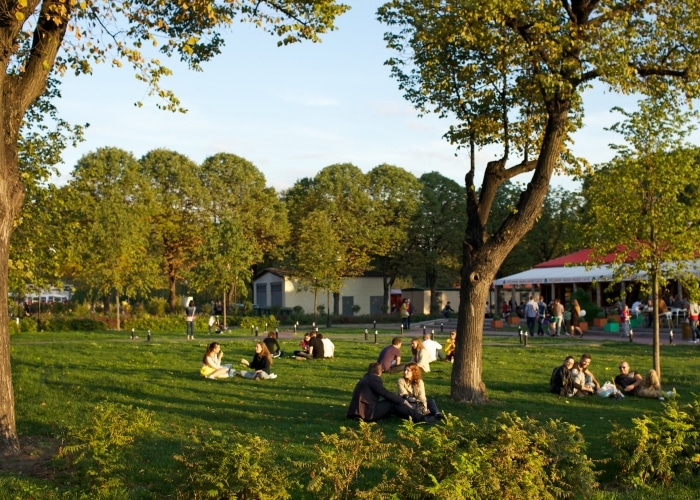
For a breath of fresh air in the Russian capital, head to Gorky Park. Created in 1928 on the banks of the Moskva River, it welcomes visitors with a monumental entrance of white colonnades, easily reached from the Park Kultury metro station. Beyond the gate, the space opens wide — greenery and pathways stretching as far as you can see.
Covering 220 hectares, the park has plenty of room to wander and offers shifting atmospheres: manicured gardens, quiet spots, sports areas, and museums set inside its pavilions. Muscovites gather here at any hour, to run, chat, or simply sit on a bench by the river.
Each season transforms the park. In winter, the ponds freeze and turn into skating rinks, the icy air following the gliding figures. In summer, the lawns fill with picnics, children’s laughter, and impromptu games — the city seems to breathe a little lighter here.
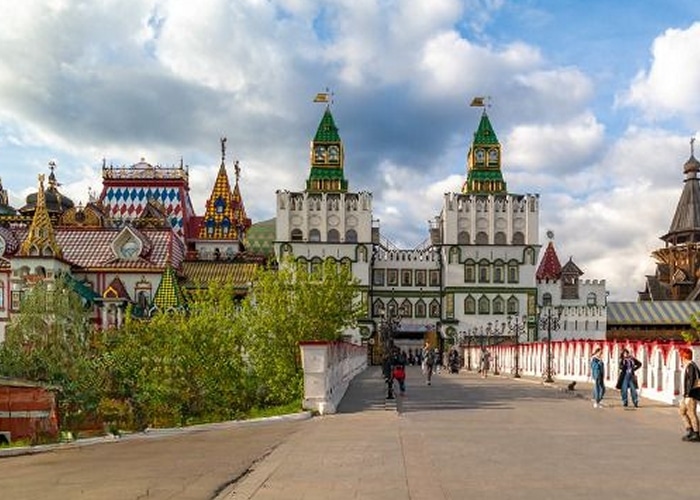
In eastern Moscow, the Izmailovo Kremlin surprises with its colorful ensemble — pointed towers, wooden galleries, glazed domes. It’s quickly clear that this is a playful reinterpretation of old Russian forms, but it works — lively, full of workshops and small chapels.
You wander from one courtyard to another, past displays of embroidery, icons, artisans at work, until you reach a room that tells the story of a famous spirit at the Vodka Museum. Nothing pompous here — just objects, dates, and labels that reveal pieces of everyday Russian life.
Right next door, the Izmailovo Market lines up its stalls with carved wood, fabrics, samovars, and all sorts of curiosities that make you want to browse. You bargain a little, chat with the vendors, and usually leave with some small keepsake.
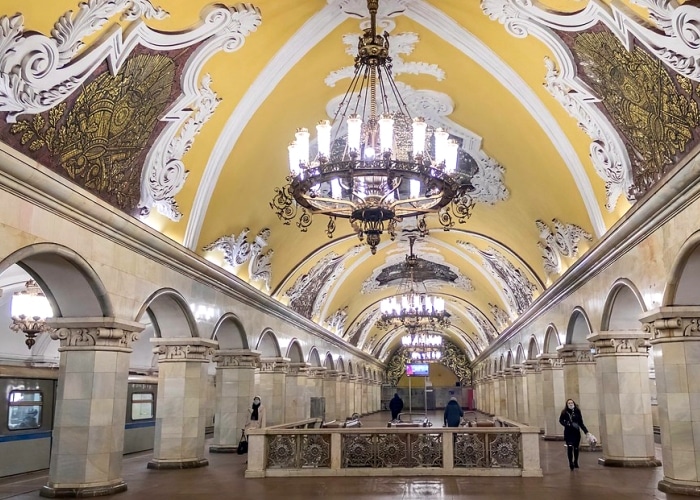
One of the great treasures of the capital lies underground — the Moscow Metro. Every day, millions of passengers ride its lines, making it one of the busiest networks in the world. The first stations, built between 1935 and 1950, still reflect Stalin’s ambition — he called them the “palaces of the people.”
Each stop has its own atmosphere, with unique decorations, materials, and patterns. Stations like Prospekt Mira, Komsomolskaya, Mayakovskaya, and Arbatskaya amaze with their polished marble, wall mosaics, and hanging chandeliers. Taking the metro sometimes feels like stepping into an underground art gallery.
On the platforms, statues and frescoes recall Soviet history and the desire to impress with grandeur. Forty-four stations are now listed as part of Russia’s cultural heritage, proof that the metro is far more than just public transport.
Another unique feature: the Moscow Metro also doubles as a shelter, buried deep beneath the city. The escalators seem endless — the one at Park Pobedy descends 126 meters. You’re left with the uncanny feeling of being in a place that is both utilitarian and monumental.